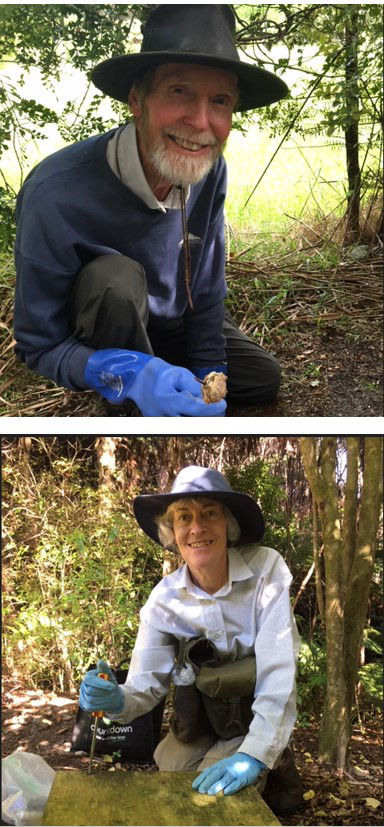Marunui Conservation - Protecting Kiwi Chicks
From 2014 to 2016 North Island Brown Kiwi were translocated to Marunui Conservation just to the north of Mangawhai in the Piroa-Brynderwyn ranges. Since that time the team at Marunui and other local volunteers have been working hard to ensure the kiwi are protected.
Over the past two months it’s been exciting at Marunui Conservation hearing pairs of kiwi calling at night. Keeping them safe from predators on its 421ha bush-covered property is one of Marunui’s main tasks and with the breeding season approaching it becomes a vital activity.
Despite the difficulties caused by Covid 19 over the past two years it has been possible to undertake and complete all the predator trapping rounds, thanks to the efforts of Marunui’s residents and the help of local volunteers.
Trapping has been carried out every three weeks from November to March and 4-weekly from April to October using a variety of baits depending on the type of trap. The majority (120) are for catching mustelids – ferrets, stoats and weasels. These include DOC200s, DOC250s and Fenns. They also catch rats, while Trapinators and Timms traps target possums.
In 2021 the catch totalled 12 stoats, 5 weasels, 5 feral cats, 156 possums, 25 hedgehogs and 228 rats. In addition, annual baiting for rats and possums was carried out in September-October, considerably reducing the numbers of both. So far this year 6 stoats, 3 weasels, 1 feral cat, 25 possums, 11 hedgehogs and 28 rats have been caught.
In addition in 2021 the Ring of Steel project, which involves the servicing of mustelid traps on properties surrounding Marunui and including in Hancock’s Waipu Forest, caught 26 stoats, 31 weasels, 1 feral cat, 56 hedgehogs and 427 rats.
Stoats are the major killer of kiwi chicks so the removal of the above 44 stoats will have been key to chick survival, potentially enabling them to reach breeding age. Together with weasels, stoats also predate other native birds, eggs, lizards and insects. Although no ferrets have been caught in Marunui since 2019, they present a major threat to adult kiwi, illustrated by the death of one male last year in Waipu Forest. A ferret was recently seen on a neighbouring property and extra traps were deployed.
The recent sighting at night in Marunui of a juvenile kiwi and the number of calls heard gives confidence that the combined efforts of all involved in Piroa-Brynderwyns Landcare are making a significant contribution to kiwi recovery in the Brynderwyns and surrounding areas.
Marunui welcomes new volunteers to help it maintain the levels of trapping required to protect kiwi (training and tools provided). If you are keen to volunteer email [email protected].
PULTENAEA TARGETED BY WEED ACTION VOLUNTEERS
On 10 September 2022, a group of keen volunteers put their combined energies into the removal of Pultenaea in an area of bush at Marunui Conservation. Also known as Australian bush pea, this weed has been identified by Northland Regional Council as requiring containment and reduction over time.
Pultenaea (Pultenaea daphnoides) is a medium-sized shrub that can grow to three metres tall. Its pea-like flowers are yellow with red-pink markings in the centre, and are followed by flat pods. It’s fast-growing and resistant to drought and frost. One bush can generate hundreds of seedlings and it has the potential to invade gumland, shrubland, open road banks, cliffs and other lower fertility sites. It is capable of causing adverse environmental effects on our native forest.
Organised by Weed Action Piroa-Brynderwyns in conjunction with Marunui Conservation a group of eight, armed with hand forks, secateurs and pruning saws, set off at 9am up the steep slopes of Pa Hill to tackle this invasive pest. Ronny Haynes Weed Action Coordinator and John Hawley of Marunui Conservation led the way.
At Marunui Pultenaea is present in a defined area of manuka shrubland and along the edges of tracks. The volunteers worked as individuals or in pairs, some tackling the larger bushes while others concentrated on smaller plants and seedlings. Rain prior to the weekend had softened the ground sufficiently to enable smaller plants to be pulled out.
Over four hours later the group packed up their tools and made their way back to enjoy a delicious lunch of savouries, cheeses and a large pot of soup provided by Weed Action. John Hawley said, “The lunch was well deserved, we covered a sizeable area and working on some steep slopes was not for the faint hearted. Those helping definitely earned the title of ‘weed warriors’”
The following day a smaller group went out and over the weekend a total of 44 hours were contributed. John said, “We’ve now been doing this work for four years and there will be other opportunities next year. The Northland Regional Council has funded contractors to work in the most difficult areas while we manage the remainder. Marunui is extremely grateful to Weed Action and those who put their hands up to help.”
